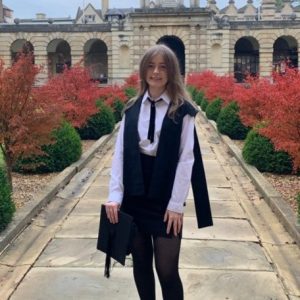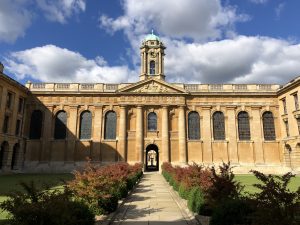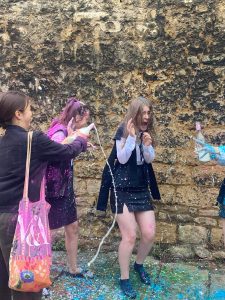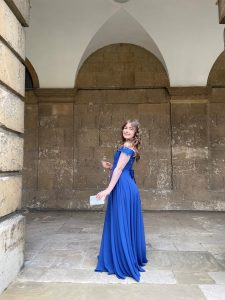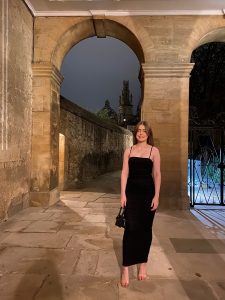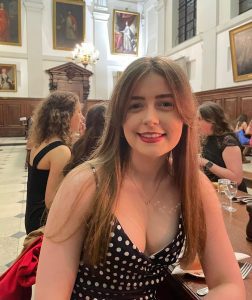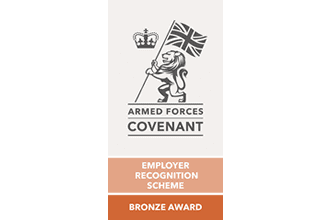To celebrate the success of our Scholars’ Programme here at Nelson and Colne College have caught up with former NCC student and Scholars’ Programme graduate, Niamh Ward. One of our distinguished alumni, Niamh has gone on to study English Language and Literature at Queen’s College, the University of Oxford. Niamh has kindly taken time out of her busy schedule to talk to us about her life at Oxford, the demands of a prestigious university English course, and her time at NCC.
From her humble beginnings in Nelson to her life in Oxford, studying English at the very highest level and taking advantage of her free time in the picturesque medieval city., venturing on treasure hunts to discover old pubs that look like they’ve been picked straight out of the Harry Potter universe and soaking up all the culture that a city with the history of Oxford has to offer, Niamh reveals all.
Niamh is also really keen to dispel any myths about Oxford being ‘out of reach’ for students from the North West, and we want everyone to see just how Nelson and Colne College can provide a great route to the best universities in the country.
Read on to discover more.
_______________________________________________________________________
Firstly, let us get to know you. What are your hobbies and interests outside of studying Language and Literature at such a high level?
Aside from my academic interest in English Language and Literature, I love music, baking and going to the gym.
I am slightly addicted to watching (and often re-watching) many popular American sitcoms- think Big Bang Theory, Modern Family etc.
I have too many favourite films to list, although I am easily won over by a rom-com, and I tend to continually change my answers to ‘What is your favourite book?’ every other day as I lose track of all the reads I’ve enjoyed!
What brought you to NCC and did you enjoy your time with us?
I thoroughly enjoyed my time at NCC, both academically and socially, and often wish it could’ve been a longer stay than two years!
I remember having incredibly supportive teachers, who not only aided me and my fellow classmates with our general learning, but often went the extra mile to help students with their individual goals. For me, of course, that was applying to the University of Oxford.
I decided upon NCC as my top college choice as I had participated in many events and schemes run through the College whilst I was at high school, which I enjoyed and found very useful for envisioning my then future-self attending NCC.
These events included what was then called the Boat Race Challenge, which involved a competitive application process across various schools in Lancashire and resulted in myself, some of my classmates from high school and other students, writing an extended essay on a research topic of our choice and then visiting The Queen’s College in Oxford to present our research topics. I currently attend Queen’s and so found the support and organisation of the scheme at NCC integral to my later choice of university.
Did NCC support you and help open doors for you to go on and study at Oxford University?
Whilst attending NCC, I was invited to various workshops targeted at those students who might be considering Oxbridge universities. At the time this was a possibility that I hadn’t fully committed myself to but that these workshops and the wider support at NCC encouraged me to view as within my reach.
They provided valuable support and advice on the application process, interview skills and personal statement advice.
This support, alongside the amazing help of my NCC English Literature tutor, made both the thought and action of applying to the University of Oxford much less nerve-wracking and made me feel comfortable with the quite daunting process that I was going through.
What’s the day-to-day academic life like for an Oxford University student?
A day in the life of an Oxford humanities student is probably markedly different to that of a science, technology, engineering and maths (STEM) student. Humanities students, like myself, tend to have the bulk of their content taught through seminars and tutorials, rather than the lectures being a large focus, as they are for STEM students.
I usually have one seminar a week, which is basically a two-hour long class, and one tutorial, which is a more one-to-one interaction with your tutor as they provide feedback on an essay you’ll have submitted.
The majority of my lectures are optional, but I try to go to as many as possible, particularly those that relate to my specific interests, the topics I’m studying that term and anything that I believe will help me when writing my weekly essays. Although, this does leave me a lot of free time during most days, especially if I have no contact hours.
The expectation is that you spend your time working and planning independently so that you’re fully prepared for all deadlines, lessons and tutorials.
My lectures are hosted at the faculty buildings, unlike my seminars and tutorials which are held in my college by the three tutors that I’ve known for the duration of my degree. It’s great being able to interact closely with your tutors in this way, as they not only get to know your writing and work very well, but also get to know you on a personal level and so always help with any worries, workload troubles etc.
The picturesque grounds of Queen’s College. Founded in 1341 and Niamh’s academic home.
What about outside of your studies? How is Oxford city life for a 20-year-old?
A major positive that I’ve quickly come to realise about Oxford is that, because it’s such a popular tourist destination, the shops, pubs and cafes all live up to a high standard for us students too.
There is an insane number of old pubs in Oxford, often hidden in random locations as though you’re going on a treasure hunt to find them all. A particular favourite of mine is called the Turf Tavern, which is down a little ginnel that gives me major Harry Potter vibes for some reason!
There are lots of different clubs as well and students usually argue over which club is best- a hotly debated topic that I’m still yet to find a straight answer to.
There’s also a covered market in the centre of Oxford with lots of random little shops, cafes and dessert places.
Even though there is a widespread assumption that Oxford students won’t actually have enough time to enjoy these things, we definitely still have plenty of free moments every day to do something social if we want and definitely don’t have a curfew set for us contrary to what many people believe!
Most colleges host regular bops (themed parties) in their college bars where we get an excuse to dress up and have extremely discounted drinks so we’re never short of options of what to do socially.
Niamh being ‘trashed’ with shaving foam, confetti and drinks after her End of Year exams – An Oxford tradition to mark the end of the first year.
All dressed up for a college ‘bop’.
What is the English Language and Literature course like at Oxford University?
The English Language and Literature course at Oxford is very different from other universities, in that it focuses on covering each period of English literature across your degree, spanning from Medieval Old English texts like Beowulf to the twentieth-century modernist works of Virginia Woolf.
Of course, there’s still the option to choose which topics and texts interest you the most, but English students would usually always cover each period sometime during their degree.
I’m currently in my final year, with much more of a coursework focus this year. At the moment, I’m working on my ‘Special Options paper’ (a mini-dissertation of sorts, clocking in at 6000 words) which is looking at criminality in the sixteenth and seventeenth centuries, in pamphlets, legal documents, and literary texts too.
I’m also beginning to plan my third-year dissertation, which is about how the writer Angela Carter conceptualised the space of her short stories in markedly economic terms and constructed an aesthetics of containment in this shorter form, reflecting more broadly upon the processes of constructing and publishing short stories that differed markedly from novels.
I actually first encountered Angela Carter whilst at NCC, as my English Literature gothic paper was on her short-story collection: The Bloody Chamber. I’ve been eager to return to her work since then and so have chosen to focus on her for my dissertation.
What are your fondest memories from your time at NCC?
My fondest memories of NCC are of when I would spend time with my friends in one of the Social Science work zones. We’d meet there after our classes and do some work or revision before grabbing some lunch together and waiting for any afternoon classes (often taking another trip down to the refectory for more snacks).
It doesn’t sound like anything particularly special when described and it happened more or less every day of my second year at NCC before COVID hit, but having a space like that where we could all meet, work together and talk outside of classes made it the most enjoyable experience of spending time between lessons that I’ve had across my whole education.
What do you miss most about your time here?
Aside from missing hearing plenty of northern accents at NCC, I’d say what I miss the most about my time there is my tutors who consistently supported me and the events and extra-curricular activities which really made my time at NCC even more exciting. I was part of the Pre-Professional Journalism Programme, so I helped with multiple editions of the college magazine, and I also attended the book club (very English student behaviour from me there!) which was such an interesting way to read new material that I probably wouldn’t have attempted to read until later in my education.
What do you plan to do after university and how is Oxford supporting you in your ambitions?
My plan for after university is to apply for graduate schemes in publishing companies based in Manchester, to try and get my foot in the door of, hopefully, a brilliant publishing company! I’ve been lucky enough to have completed a couple of internships with publishing companies in the South of England that my university have let me know about and I’m also just beginning to work with the Oxford Student Publications Limited (OSPL), which is the student-run publishing company of the very well-known Oxford student newspapers, like The Cherwell.
Niamh in the ornate and historical Queen’s College dining hall, where students can enjoy discounted meals.
What advice would you give to current students at NCC who are inspired by your success but may see Oxford as ‘out of reach’?
My advice to anyone who may believe that Oxford is out of reach or an unrealistic goal for someone from the North-West is to just go for it! You have as much of a chance and as much potential as any other applicant and shouldn’t let any myths about Oxford put you off. It is, inevitably, a nerve-wracking process, applying to one of the top universities in the country. Nevertheless, you’ll never know whether it could be successful unless you try.
I certainly didn’t expect to be successful and have actually met many people at university now who felt the exact same when applying, but that shouldn’t be something that stops you if you truly want to experience all the great things that Oxford has to offer. You might surprise yourself and end up having the best three or four years of your life here!
_______________________________________________________________________
Niamh very generously volunteered time out of her busy schedule of studying literature, writing essays, and drinking in Harry Potteresque taverns in order to conduct this interview and we are very grateful. The love she still harbours for her home here, her fond memories at NCC and her Northern roots are very apparent and it fills us with pride to hear from ex-students who have progressed on to amazing things and are realising their academic dreams.
As a member of the Scholars’ programme, Niamh had access to seminars, personalised support for competitive university applications and organised visits to the top UK universities (of which Oxford was one).
The programme aims to nurture ambitious academic young minds, developing their knowledge and understanding around science, the arts, politics, economics, culture, philosophy and identity.
Students within the programme are encouraged to explore these areas further than the syllabus dictates, and to engage in debates, presentations and seminars – all of which facilitated Niamh, and many others, in their dreams to study at the UK’s finest learning institutions.
Niamh’s most helpful asset in her Oxford goal however was herself. Her success is a testament to her hard-working, inquisitive and passionate character. She has some amazing things lined up in her future and we can’t wait to hear what she gets up to next.
If you would like to learn more about what we have to offer here at Nelson and Colne College or to learn more about the Scholars’ Programme, then do not hesitate to speak to our friendly admissions team at 01282 440272 or email admissions@nelsongroup.ac.uk.


